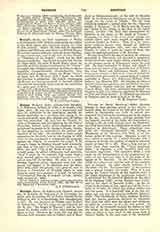

Brenach, Saint, an Irish missionary in Wales, a contemporary of St. Patrick, and among the earliest of the Irish saints who labored among the Celts of that country. About the year 418 he travelled to Rome and Brittany, and thence to Milford Haven. He erected various oratories near the rivers Cleddau, Gwain, and Caman, and at the foot of Carn Engyli, or “Mountain of the Angels”, which was his most famous foundation. Among his converts was Brecan (an Irish chief), the ruler of South Wales, about the year 425, and this Brecan is reckoned by the “Triads” as a saint, who founded numerous churches in Brecknockshire, Carmarthenshire, Pembrokeshire, Denbighshire, and Anglesey. From the Welsh “Lives” we learn that St. Brenach died April 7, on which day his feast is celebrated. His church, overhanging the Severn, is a lasting memorial of the Irish pilgrim who was the instrument under God for the conversion of a great part of Wales.
W. H. GRATTAN FLOOD

